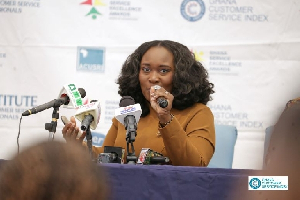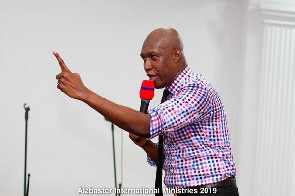Accra, June 16, GNA - The National Reconciliation Commission (NRC) in its Report recommended a referendum on the Indemnity Clause and Transitional Provisions in the 1992 Constitution for a national decision on the fate of perpetrators of human rights abuses. The referendum, according to the Most Rev Gabriel Charles Palmer-Buckle, a Member of the erstwhile Commission, would allow the democratic processes of the nation to take place.
The Most Rev Palmer-Buckle, who is also the Metropolitan Catholic Archbishop of Accra, said there was the need for a real open debate to allow society to do the judgement on the atrocities committed against humanity. The Cleric touched on the recommendation in answer to a question on if it were possible to achieve true national reconciliation and integration while the perpetrators of human right abuses walked about and acted in provocative manner with impunity. This was after he had delivered a paper on: "Reconciliation and National Integration" on Wednesday, the final day of a three-day public forum on "Reconciling the Nation" organised jointly by the Ghana Academy of Arts and Sciences (GAAS) and the Friedrich Ebert Foundation (FES) in Accra.
Most Reverend Palmer-Buckle said the work of the NRC was an indispensable component of healing the wounds of human right abuses of the nation, "to look at ourselves critically and prevent such violations in the future." He said he was happy that the Government had accepted the NRC Report and promised in its White Paper to implement the recommendations.
Most Rev Palmer-Buckle reiterated that reconciliation was a process: an enquiry into human rights abuses, making public the report of enquiry and implementing the recommendations of the enquiry, adding that the fist aspect of the process was completed with the work of the Commission. He proposed a national celebration of Reconciliation Day; the development of rituals and the building of a national reconciliation tradition by expressing the findings of the Commission through theatre art forms like films, drama, and songs. The National Commission on Civic Education (NCCE) and Commission on Human Rights and Administrative Justice (CHRAJ) should also mount sustained education on human rights.
Politics NRC Provisions 2 Accra Most Rev Palmer-Buckle said the NRC Report also recommended among other things that the President, through the mass media should make a formal apology to the nation, especially to the Ghanaian woman. He said the Report, now on the Ghana Government website, called for similar apology from State institutions mentioned in the abuse of human rights.
Professor Henrietta Abena Nyarko Mensa-Bonsu, another Member of the Commission in a paper, said national integration was a development imperative that the country must strive to achieve by a conscious policy of national reconciliation. She traced the history of the segmentation bedevilling the nation to the partitioning of Africa and colonialism with its divide and rule method that heightened ethnic rivalries and observed that the formation of national parties in the immediate pre-independence era helped to bridge some of the old gaps. However, the practice of partisan politics and personal power struggles among the leaders had helped to create new animosities.
Prof Abena Mensah-Bonsu said the country must devise strategies to produce the requisite peace and calm among the diverse elements of the Ghanaian society, by going back to the drawing board to redesign means of achieving consensus and agreement as to what should be the way forward. She said the reconciliation process must involve changes in both the external and internal environments such as changes in personal attitudes and approaches to the resolution of problems that emerged as
time went on. Prof Abena Mensa-Bonsu observed that it would take various social actors to continue the process and bring healing. She noted that civil society, especially the faith community, that cut across ethnic class and ethnic origin must have failed in its duty if it did not grab the opportunity to offer leadership in the process of promoting national integration through national reconciliation. There is also the duty to teach the correct history of the nation to the young people, Prof Abena Mensa-Bonsu said, adding that history textbooks should portray the truth. She said there was the need for a body in the nature of an Equal Opportunities Commission, tasked to ensure that all Government policies would foster forgiveness, and empowered to receive complaints of discrimination of every kind, be they State agencies, public bodies or anyone exercising power or authority in a matter that was public in nature.
Professor Kwesi Yankah, Honorary Secretary of the GAAS, suggested the establishment of an independent Commission to see to the implementation of the recommendations of the NRC Report. Justice Prof Samuel Date-Bah, Justice of the Supreme Court of Ghana, chaired the forum, which was attended by the Nana Dr S. K. B. Asante, President of the Academy, Members of the Council of State, Members of the NRC, Members of parliament and students.
General News of Thursday, 16 June 2005
Source: GNA












